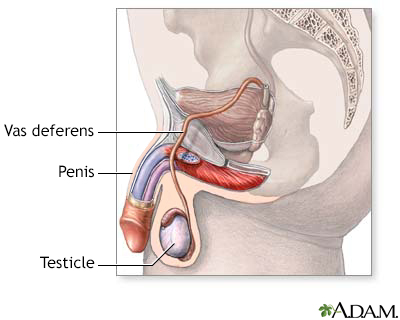Pregnancy SmartSiteTM
Epididymo - orchitis; Testis infection DefinitionOrchitis is swelling (inflammation) of one or both of the testicles. CausesOrchitis may be caused by an infection. Many types of bacteria and viruses can cause this condition. The most common virus that causes orchitis is mumps. It most often occurs in boys after puberty. Orchitis most often develops 4 to 6 days after the mumps begins. Orchitis may also occur along with infections of the prostate or epididymis. Orchitis may be caused by a sexually transmitted infection (STI), such as gonorrhea or chlamydia. The rate of sexually transmitted orchitis or epididymitis is higher in men ages 19 to 35. Risk factors for sexually transmitted orchitis include:
Risk factors for orchitis not due to an STI include:
SymptomsSymptoms include:
Exams and TestsA physical exam may show:
Tests may include:
TreatmentTreatment may include:
Outlook (Prognosis)Getting the right diagnosis and treatment for orchitis caused by bacteria can most often allow the testicle to recover normally. You will need further testing to check for testicular cancer if the testicle does not completely return to normal after treatment. Mumps orchitis has no effective treatment, and the outcome can vary. Men who have had mumps orchitis can become sterile. Possible ComplicationsSome boys who get orchitis caused by mumps will have shrinking of the testicles (testicular atrophy). Orchitis may also cause infertility. Other potential complications include:
Acute pain in the scrotum or testicles can be caused by twisting of the testicular blood vessels (torsion). This is a medical emergency that requires immediate surgery. A swollen testicle with little or no pain may be a sign of testicular cancer. If this is the case, you should have a testicular ultrasound. When to Contact a Medical ProfessionalSee your health care provider for an exam if you have testicle problems. Get emergency medical help if you have sudden pain in the testicle. PreventionThings you can do to prevent the problem include:
ReferencesGans HA. Mumps. In: Kliegman RM, St. Geme JW, Blum NJ, et al, eds. Nelson Textbook of Pediatrics. 22nd ed. Philadelphia, PA: Elsevier; 2025:chap 295. McGowan CC. Prostatitis, epididymitis, and orchitis. In: Bennett JE, Dolin R, Blaser MJ, eds. Mandell, Douglas, and Bennett's Principles and Practice of Infectious Diseases. 9th ed. Philadelphia, PA: Elsevier; 2020:chap 110. Pontari M. Inflammatory and pain conditions of the male genitourinary tract: prostatitis and related pain conditions, orchitis, and epididymitis. In: Partin AW, Domochowski RR, Kavoussi LR, Peters CA, eds. Campbell-Walsh-Wein Urology. 12th ed. Philadelphia, PA: Elsevier; 2021:chap 56. | |
| |
Review Date: 1/1/2025 Reviewed By: Kelly L. Stratton, MD, FACS, Associate Professor, Department of Urology, University of Oklahoma Health Sciences Center, Oklahoma City, OK. Also reviewed by David C. Dugdale, MD, Medical Director, Brenda Conaway, Editorial Director, and the A.D.A.M. Editorial team. The information provided herein should not be used during any medical emergency or for the diagnosis or treatment of any medical condition. A licensed medical professional should be consulted for diagnosis and treatment of any and all medical conditions. Links to other sites are provided for information only -- they do not constitute endorsements of those other sites. No warranty of any kind, either expressed or implied, is made as to the accuracy, reliability, timeliness, or correctness of any translations made by a third-party service of the information provided herein into any other language. © 1997- A.D.A.M., a business unit of Ebix, Inc. Any duplication or distribution of the information contained herein is strictly prohibited. | |

 Male reproductive ...
Male reproductive ... Male reproductive ...
Male reproductive ...
